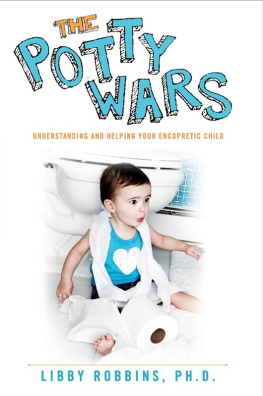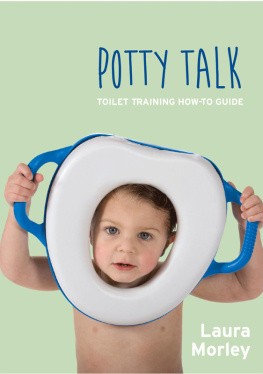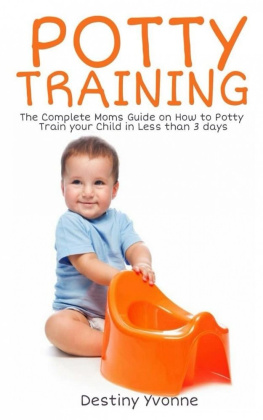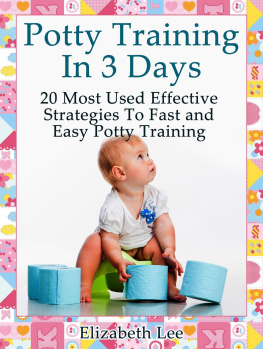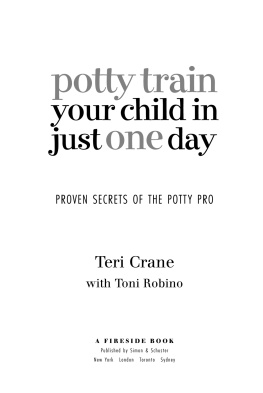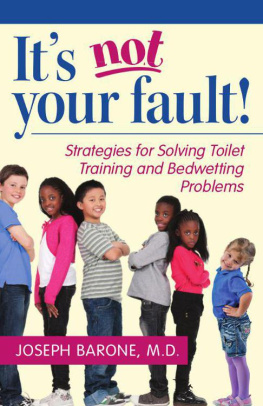
ISBN: 9781631928604
CONTENTS
INTRODUCTION
When I began my private practice, my first patient was a five-year-old girl who suffered from chronic constipation and soiling. In every other way, she was a bright, good-natured little girl, but her toileting behavior was driving her parents crazy. Her mother was worried, embarrassed, and defensive, after years of listening to well-intentioned, but ineffective advice from her mother, other relatives, and friends. Her father was certain that his daughter was acting willfully, and that if she were punished enough, she would snap out of it. There were regular angry exchanges between parents and child over using the toilet, and frequent disagreements between the parents about how to handle the situation.
In my first meeting with the parents, I was rather baffled about the cause of this symptom, which was clearly uncomfortable for the child, and unpleasant for the whole family. Yet, a dim prickling at the edge of my memory made me think I had encountered this problem before. Upon reflection, I recalled a boy, named Joey in my class of three and four-year-olds at the daycare center where I taught after receiving my Masters degree in Special Education. Joey soiled himself several times a week, and it was my job to clean and change him. I remembered how frustrated and angry I got over having to do this unpleasant chore, when all he had to do was tell me he needed to use the toilet. After I left the daycare center for a job in Special Education, I discussed Joey with my supervisor, who was a child psychiatrist. She informed me that he was probably suffering from a disorder called encopresis, and that he needed therapy rather than discipline.
Fortunately, my first case responded well to play therapy and parent guidance work. During my work with the little girl, it became clear that withholding stool was a symptom of her powerful anxiety about the safety of her body and her ability to contain her angry impulses. Exploring those issues with her, and helping her parents to disengage from the battle for control they were waging against their daughter were key factors in resolving the problem.
No sooner had I finished congratulating myself for managing to stumble my way to a satisfactory resolution, than another set of parents with another encopretic child appeared in my office. Before I knew it, I had been discovered by the Pediatric Gastroenterology community, and a steady stream of young children with encopresis was parading through my office. I was stunned by the number of families who were struggling with this disorder; but when I tried to find information about the mental health aspects of encopresis, there was little available. There were plenty of articles about medical and behavioral treatments for encopresis, but only a handful of publications in the mental health journals, and even fewer resources for parents, who were hungry for information and advice about their children.
Over the years, I have worked with over one hundred encopretic children and their families. Parents regularly ask me for the name of a book they can read to learn about toileting problems, and are frustrated when I have little to offer. I used to joke that there is no book to read because I havent written it yet. Parents were not amused. One mother even offered to help me write the book. So, with endless gratitude to all the children and parents who have taught me about encopresis over the years, I have conquered my writers constipation and produced this book. I hope it provides you with information about your child, and some useful techniques to try at home. You may decide to consult a mental health professional about your encopretic child. Whatever your situation may be, I hope this book will be helpful to you, even if just to reassure you that you are in good company with other parents who are trying their best to help their children with a difficult problem.
Before I begin, its important for me to let you know that the vignettes of parents and children in these pages are created from composites of families I have worked with. None of the names or descriptions represent actual people or their circumstances.
A final warning: I occasionally attempt to use humor in this book. Encopresis is a serious, upsetting condition, and I do not take it lightly. On the other hand, I dont want to write or subject you to a dry professional thesis. Lets face it, this is a book about pooping and children - two topics that are both professionally interesting and endlessly amusing to me.

UNDERSTANDING ENCOPRESIS
CHAPTER 1
WHAT IS ENCOPRESIS ANYWAY?
Sams mother, Linda, is beginning to feel frantic. Sam is supposed to be in a pre-kindergarten class five days a week at his preschool this fall. The school has made it clear that Sam cannot attend the program unless he is potty trained. By the end of last year, his teacher was pretty fed-up with Sams daily accidents, and complained to Linda on several occasions. She advised Linda to let Sam spend a weekend in the house without wearing any diaper or underwear, certain that he would be forced to use the potty when the urge struck. Linda forced a smile and thanked her for the suggestion, but sighed to herself. She had tried the bare bottom method months ago, to the detriment of her family room carpeting. In fact, Linda was pretty sure she had tried every trick in the book to train Sam, with no success. He simply refused to use the potty even the one that played music and only pooped in a pull-up after holding in his stool for days at a time. Linda felt that she could live with the pull-ups if it werent for the continual small accidents several times a day. The mess and odor were so embarrassing for Linda (although apparently not for Sam) that she was uncomfortable taking him to playdates, restaurants, or even his grandparents house. They really didnt go anywhere that Linda could not swiftly and discreetly launch a clean-up operation when Sam soiled himself. It seemed to Linda that her world revolved around Sams bowel movements, and she was becoming increasingly angry at her own helplessness and Sams stubbornness. Linda doesnt know it yet, but she is dealing with an encopretic child.
The Diagnostic and Statistical Manual (DSM-IV-TR, 2000) is the reference used by mental health professionals, which lists all of the possible mental health diagnoses, along with their symptoms. Encopresis is defined by the DSM-IV-TR as the passage of stool in inappropriate places at least once a month for three months by children ages four and older, for which no physical cause can be found. There are two types of encopresis: encopresis with constipation and overflow incontinence; and encopresis without constipation and overflow incontinence. In addition, encopresis may be primary, when the child has never successfully toilet trained, and secondary, when the child was toilet trained for a period of time and then began having accidents.
Estimates are that between 1.5% and 7% of children suffer from encopresis, with a higher incidence in boys than in girls. Between 85% and 90% of encopresis cases are the type associated with constipation and overflow incontinence. Children with this type of encopresis often withhold their bowel movements until they become constipated. When there is a solid mass of stool held in the childs colon, liquid stool seeps around the mass and out of the anus, causing soiling. While this is the most common type of encopresis, there are other reasons children poop in their pants past the age at which most children are potty trained. I will talk more about these issues later.
Next page
